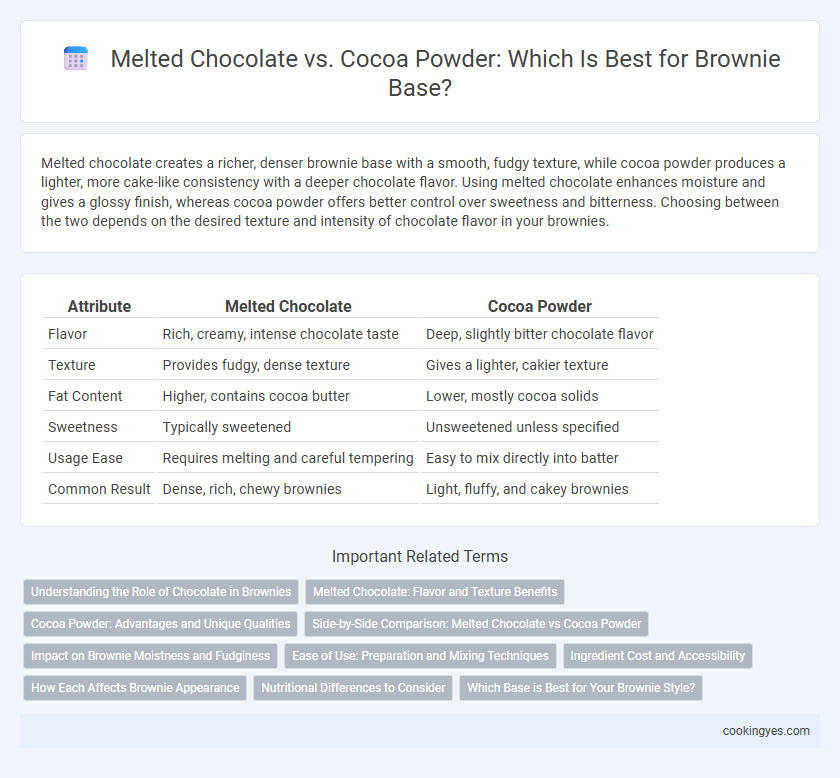Melted chocolate creates a richer, denser brownie base with a smooth, fudgy texture, while cocoa powder produces a lighter, more cake-like consistency with a deeper chocolate flavor. Using melted chocolate enhances moisture and gives a glossy finish, whereas cocoa powder offers better control over sweetness and bitterness. Choosing between the two depends on the desired texture and intensity of chocolate flavor in your brownies.
Table of Comparison
| Attribute | Melted Chocolate | Cocoa Powder |
|---|---|---|
| Flavor | Rich, creamy, intense chocolate taste | Deep, slightly bitter chocolate flavor |
| Texture | Provides fudgy, dense texture | Gives a lighter, cakier texture |
| Fat Content | Higher, contains cocoa butter | Lower, mostly cocoa solids |
| Sweetness | Typically sweetened | Unsweetened unless specified |
| Usage Ease | Requires melting and careful tempering | Easy to mix directly into batter |
| Common Result | Dense, rich, chewy brownies | Light, fluffy, and cakey brownies |
Understanding the Role of Chocolate in Brownies
Melted chocolate provides a rich, creamy texture and deep flavor to brownies, contributing to their fudgy consistency and intense cocoa taste. Cocoa powder, being unsweetened and dry, offers a lighter, more cake-like crumb while allowing for greater control over sweetness and fat content. Understanding these roles helps bakers tailor the brownie's density, moisture, and flavor profile to achieve desired results.
Melted Chocolate: Flavor and Texture Benefits
Melted chocolate enhances brownie flavor by providing a rich, intense cocoa taste with a deeply complex profile, unlike cocoa powder which offers a lighter, more powdery essence. Using melted chocolate results in a fudgier, denser texture, delivering a moist, indulgent bite that cocoa powder alone cannot achieve. The fat content in melted chocolate also contributes to a smoother, creamier mouthfeel, amplifying the overall sensory experience of the brownie.
Cocoa Powder: Advantages and Unique Qualities
Cocoa powder enhances brownie recipes by providing a rich, intense chocolate flavor with less fat content compared to melted chocolate, making it ideal for dense, fudgy textures. Its dry form allows for better integration with dry ingredients, offering a more controlled consistency and deeper chocolate color. The natural acidity of cocoa powder also reacts with baking soda, helping brownies rise and achieve a tender crumb.
Side-by-Side Comparison: Melted Chocolate vs Cocoa Powder
Melted chocolate provides rich, creamy texture and intense flavor, enhancing the brownie's fudginess and creating a glossy finish, while cocoa powder offers a more concentrated chocolate taste with a lighter, cakier texture. Melted chocolate contains cocoa butter which contributes to moisture and softness, whereas cocoa powder lacks fat, requiring additional fat sources like butter or oil to maintain tenderness. Choosing between melted chocolate and cocoa powder impacts the brownie's density, moisture level, and depth of chocolate flavor, making it essential to consider desired texture and taste outcomes.
Impact on Brownie Moistness and Fudginess
Melted chocolate contributes to a richer, moister brownie base due to its higher fat content, resulting in a denser, fudgier texture. Cocoa powder, being fat-free, produces a lighter, more cake-like crumb but can dry out brownies if not balanced with additional fat. Using melted chocolate enhances both moisture retention and fudginess, making it ideal for those seeking a decadent, chewy brownie.
Ease of Use: Preparation and Mixing Techniques
Melted chocolate provides a smoother, more straightforward mixing process due to its creamy texture, which easily incorporates into batter without clumping. Cocoa powder requires careful sifting and blending with fats or liquids to prevent lumps and ensure even distribution in the brownie base. Using melted chocolate can reduce preparation time and simplify technique, making it more user-friendly for both beginners and experienced bakers.
Ingredient Cost and Accessibility
Melted chocolate generally increases the ingredient cost of brownies due to its higher price compared to cocoa powder, which is a more affordable and widely accessible option. Cocoa powder offers versatility and ease of use, making it a common choice for budget-conscious bakers seeking a rich chocolate flavor without the expense of whole chocolate bars. Availability of cocoa powder in most grocery stores worldwide enhances its practicality for home baking versus the occasional specialty requirement of melted chocolate.
How Each Affects Brownie Appearance
Melted chocolate creates a glossy, fudgy brownie base with a denser texture and a rich, deep brown color, enhancing visual appeal through smooth, shiny surfaces. Cocoa powder, in contrast, produces a matte finish with a lighter brown tone and a more crumbly, cakey texture that highlights a rustic, homemade look. The choice between melted chocolate and cocoa powder significantly influences the brownie's visual richness and texture perception.
Nutritional Differences to Consider
Melted chocolate contains higher fat and sugar content compared to cocoa powder, contributing to a richer texture but increased calorie count in brownies. Cocoa powder is lower in fat and sugar, offering a more intense chocolate flavor with fewer calories and added antioxidants like flavonoids. Choosing between melted chocolate and cocoa powder affects not only the brownie's nutritional profile but also the overall taste and texture outcomes.
Which Base is Best for Your Brownie Style?
Melted chocolate creates a rich, dense brownie with a fudgy texture due to its higher fat content and smooth consistency, ideal for those who prefer indulgent, gooey treats. Cocoa powder, whether natural or Dutch-processed, produces a lighter, cakier brownie with a more intense chocolate flavor and less fat, perfect for a tender crumb and pronounced chocolate taste. Choosing melted chocolate suits thick, luscious brownies, while cocoa powder is best for lighter, more aerated textures.
Melted Chocolate vs Cocoa Powder for Brownie Base Infographic

 cookingyes.com
cookingyes.com